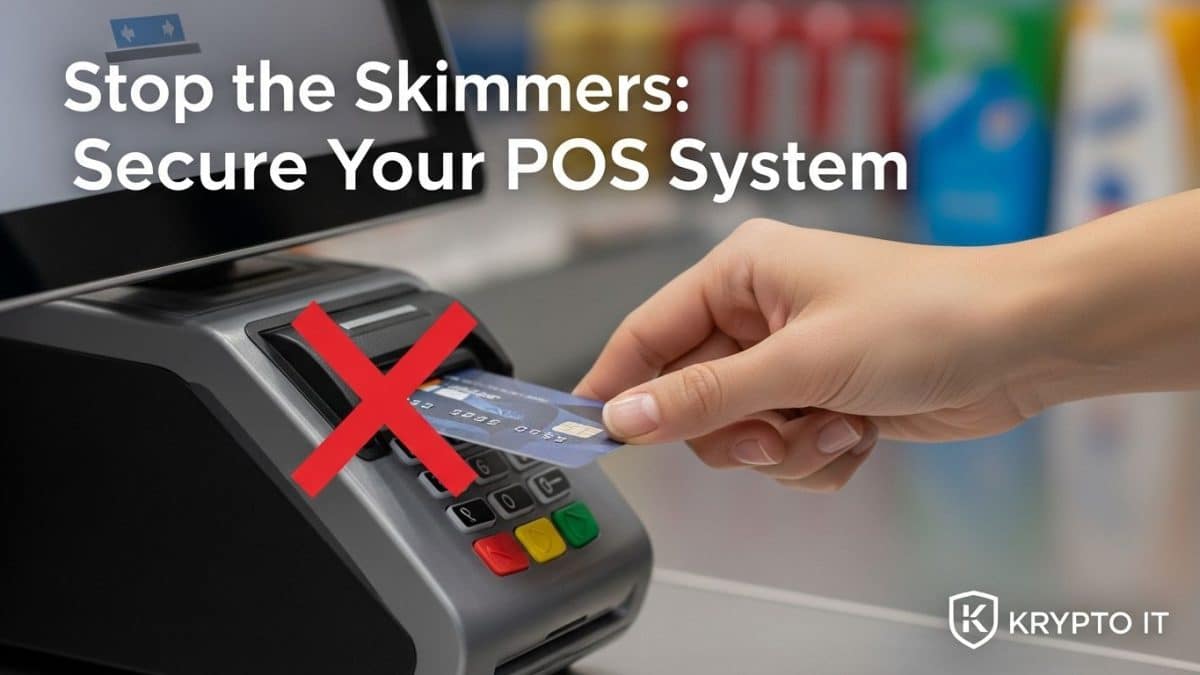
Beyond the Call: Securing Your VoIP System
August 22, 2025
Beyond the Surface: A Simple Guide to Network Vulnerability Scanning
August 25, 2025A Practical Guide to Protecting Your Houston Business from Payment Fraud
For many Small and Medium-sized Businesses (SMBs) in Houston, the Point-of-Sale (POS) system is the heart of your operation. It’s where you process payments, manage inventory, and directly interact with your customers. But for cybercriminals, your POS is a prime target—a direct pipeline to valuable payment card data. The threats are no longer just the physical skimmers we’ve learned to look for at gas stations. They are sophisticated, digital, and often invisible, making them a significant risk for any Houston SMB that accepts credit or debit card payments.
A single POS security breach can be devastating, leading to massive financial losses, irreparable damage to customer trust, and severe regulatory fines. The good news is that with a proactive approach, you can fortify your defenses and protect your business from these cunning cyber threats.
Understanding the Double Threat: Physical and Digital Skimmers
Cybercriminals today are masters of deception, employing two main types of “skimmers” to steal payment data:
- Physical Skimmers: These are malicious devices that criminals physically attach to legitimate card readers at ATMs, gas pumps, or even your POS terminal. They are designed to be a perfect fit and are often hard to detect. They work by intercepting and storing the card’s magnetic stripe data as the customer swipes it. A tiny, hidden camera or an overlay keypad is often used to steal the customer’s PIN.
- How to Spot Them: Your team should be trained to perform quick visual and physical inspections of your POS terminals. Look for anything that seems a bit off, like a bulky attachment on the card reader, a loose or wobbly part, or a broken security seal or sticker. Compare terminals side-by-side to spot discrepancies.
- Digital Skimmers (Magecart Attacks): This is a more sophisticated and stealthy threat that targets online businesses. Digital skimmers, also known as “Magecart” attacks, involve hackers injecting malicious code into your website’s payment page or a third-party script you use. When a customer enters their credit card details on your checkout page, the malicious code captures the information and sends it directly to the attacker’s server, all without the customer or you knowing it.
- How They Work: Attackers exploit vulnerabilities in outdated website software or third-party plugins. They can even compromise a legitimate vendor’s code (like a marketing tracker or analytics script) that you use, creating a supply chain attack that affects your website.
The Real-World Impact: Why POS Security is Non-Negotiable
The consequences of a POS breach can be catastrophic for a Houston SMB:
- Financial Losses: Beyond the stolen card data, your business faces the costs of forensic investigations, legal fees, credit monitoring services for affected customers, and potential chargebacks. The average cost of a retail data breach can run into the millions, a figure that can easily put a small business out of business.
- Reputational Damage: A POS breach shatters customer trust. Customers lose confidence in your ability to protect their information, leading to a decline in loyalty and a loss of sales that can take years to recover from.
- Compliance Fines: The Payment Card Industry Data Security Standard (PCI DSS) is a non-negotiable requirement for any business that stores, processes, or transmits cardholder data. A breach often results in a violation of these standards, leading to significant fines from credit card companies and a potential ban on processing card payments.
- Operational Disruption: A breach may require you to take your POS systems offline for a forensic investigation, causing operational disruption and lost sales opportunities.
- Legal and Regulatory Consequences: Businesses may face legal actions from customers and penalties from regulators for failing to adequately protect customer data.
Securing Your POS System: A Practical Checklist for Houston SMBs
Protecting your business from POS threats requires a layered approach that combines physical, technical, and human security measures. Here is a practical checklist for your Houston SMB:
- Physical Security:
- Inspect Terminals Daily: Train your employees to perform a daily visual and physical inspection of all POS terminals for any signs of tampering.
- Change Serial Numbers: Keep a record of your terminal’s serial numbers and verify them during inspections.
- Secure Devices: Physically secure your terminals to prevent them from being moved or tampered with.
- Network and Software Security:
- Network Segmentation: Crucially, isolate your POS system on a separate network from your regular business network. This prevents an attacker who gains access to an employee’s computer from being able to pivot to your payment systems.
- Use a Firewall: Enable a firewall to block unauthorized network access to your POS devices.
- End-to-End Encryption: Ensure your POS system uses end-to-end encryption to scramble payment data from the moment the card is read until it reaches the payment processor.
- Regular Updates: Keep all POS software, operating systems, and firmware up-to-date with the latest security patches to close known vulnerabilities.
- Antivirus Software: Install and regularly update antivirus software on your POS terminals, as they are a form of computer and are susceptible to malware.
- Access and Authentication:
- Change All Default Passwords: Change all default passwords for your POS terminals and management software immediately to strong, unique passwords.
- Implement Multi-Factor Authentication (MFA): Use MFA for administrative access to your POS management console.
- Restrict Access: Implement the principle of least privilege, giving employees access only to the functions they need to perform their jobs.
- Employee Training and Awareness:
- Recognize Social Engineering: Train your Houston employees on how to spot phishing emails and social engineering attempts that could be used to gain access to your systems.
- Spot Physical Tampering: Educate your employees on how to identify physical tampering and what to do if they suspect a device has been compromised.
- PIN Pad Best Practices: Train employees to never allow customers’ PINs to be viewed by others and to encourage customers to cover the keypad when entering their PIN.
Krypto IT: Your Partner in POS Security in Houston
Securing your POS system is a non-negotiable aspect of protecting your Houston business in the digital age. By implementing these practical and proactive steps, you can significantly reduce your risk of a data breach and build a reputation for trustworthiness and security with your customers. Krypto IT, based right here in Houston, specializes in helping SMBs navigate the complexities of POS security and PCI DSS compliance, providing the expertise and solutions you need to protect your business and your customers’ data.
Don’t let a hidden threat at your checkout counter put your business at risk.
Contact Krypto IT today for a free consultation and let us help you secure your POS system from all angles.




